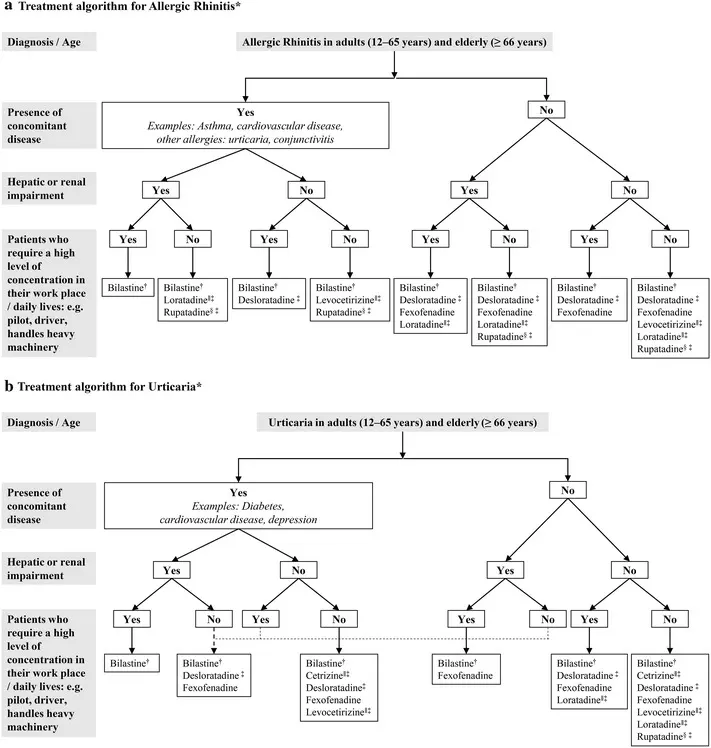Last update July 7, 2022: Trying levocetirizine , see below
Prev updated Nov, 25, 2021: Switch to Loratadine, see below
Having crossed the big 4O, I’m constantly discovering new quirks of being old, most recently, allergies :-) It started when I went on a trip to a new city in Colombia. When I got back I noticed an itch on my forearm and so I went to a nearby pharmacy. The pharmacist immediately diagnosed my itch as allergies and gave me the equivalent of Zyrtec, which has an active ingredient of cetirizine.
I began taking that, and it was great, no more itching sensation. The only problem was, that even though I was no longer in that town, but back home, I would still feel an itching sensation if I was late taking a dose of the cetirizine, which I began taking on a daily basis. I began to think maybe it was due to being springtime or the Colombian air. So, I continued with the cetirizine. Though, when back to the USA, I thought I wouldn’t need it since never in my life had I suffered from allergies and I was going to the area I grew up in, Maryland.
Well again, I was late for a dose and my forearms or other parts of me would itch. This was very strange, so I decided to check google. When searching for, itching after stopping cetirizine and sure enough, many of the results pointed to lingering effects, mainly itching, upon discontinuing with the medication. Many personal blogs mentioned it, even a few articles on the National Institute of Health, NIH, website. To be honest, I don’t see how Zyrtec can even market the drug without a warning about withdrawal symptoms.
To ween myself off of cetirizine, I’ve switched to Loratadine, which doesn’t seem to have the same withdrawal effects, yet it’s been a few weeks, and each day if I’m late, I begin to itch. So, I spoke to my doctor and it sounds like it’s yet another condition of getting older, and more sensitive to allergies. So if this happens to you, and like me you can’t find a cause in your environment, it might also be a factor of age :-)
Update, Nov 25, 2021
Ok, it’s been a few months since I initially wrote this article and I’ve got a bit more information. As mentioned, I had been taking Loratadine. To keep the dosage as small as possible, I would cut a 10mg pill into quarters. After losing some due to inexact cuts, i was left with around pieces of around 1.5-2mg. FYI, children dosage is 5mg, while for adults its 10mg. In my case, I found that the 2mg dosages worked for me. Keep in mind, it’s not allergy season, and I’m taking it on nearly a daily basis.
When do I take it, I typically wait for some sensation of itchy skin. Typically this occurs in the evening, around 5-7pm. I typically work in the office till around 4:30pm, then I walk home and sometimes practice basketball for 30 minutes. I think being outside aggravates the allergies, hence the itchy sensation afterwards. When back home, I will take a Loratadine tablet, after about an hour, the slight itching sensation goes away.
I’m sure I could take a 5mg or even 10mg tablet at a regular basics and I would also be fine, however I want to start with as little as necessary. For now, I can put up with the minor itching sensation that happens, with near daily frequency, around 6pm.
I have noticed that taking the medication also helps with a good nights sleep. When i miss taking a dose, I often wake up in the middle of the night feeling warm and thirsty.
My next investigation is to consider switching pills. There are others which have a similar effect and since I’ll be taking them all year, routine switching could delay a growing tolerance for the current one.
Update, July 7, 2022
On a routine visit to my doctor, she recommended that I try Fexofenadine. I wasn’t as familiar with that one and noticed that earlier in the article I didn’t explain all the brand name medications that you might be familiar with, and their active ingredients.
For background, we are talking about antihistamines, drugs which dampen the production of histamine, a chemical produced by your bodies immune system when triggered by allergic reactions to things like pollen, ragweed, etc.
The first generation of medications, unfortunately caused drowsiness. They have brand names that you might be familiar with, and a primary drug component.
Examples of 1st gen antihistamines (began in 1942):
- Brompheniramine (brand name: Children’s Dimetapp Cold)
- Dimenhydrinate (brand name: Dramamine)
- Diphenhydramine (brand names: Benadryl, Nytol, Sominex)
- Doxylamine (brand names: Vicks NyQuil, Tylenol Cold and Cough Nighttime)
The second generation antihistamines, addressed problems with drowsiness causes by the aforementioned first generation medications.
Examples of 2nd gen antihistamines (began in the 1980’s):
- Loratadine (brand name: Claritin) 5.0/10 based on 113 reviews
- first FDA approval 1993 April
- slower to begin working, 1-3hrs, 8hr half-life
- typical dosage 10mg
- can cause slight drowsiness
- Side effects: headache, dry mouth, difficulty falling asleep/staying asleep, diarrhea
- newer variation:
- Desloratadine (brand name Clarinex) 4.9/10 based on 31 reviews. It is an active metabolite of _loratadin_e, the chemical result once your body metabolizes loratadine.
- first FDA approval 2001 Dec
- works in first hour, long half-life of 27hr
- typical dosage 5mg
- side effects: headache, dry mouth, fatigue
- Desloratadine (brand name Clarinex) 4.9/10 based on 31 reviews. It is an active metabolite of _loratadin_e, the chemical result once your body metabolizes loratadine.
- Cetirizine (brand name: Zyrtec) 5.8/10 based on 263 reviews
- first FDA approval 1995 Dec
- begins working in first hour, 8.5hr half-life
- typical dosage 10mg
- caused light drowsiness in 14% of people in trials
- Side effects: drowsiness (<14%), headache (<14%), fatigue, diarrhea, abdominal pain
- newer variation:
- levocetirizine (brand name: Xyzal) 5.5/10 based on 324 reviews. It is very similar to Cetirizine, slightly less drowsiness but some reports say less effective
- first FDA approval 2007 May
- works in first hour, 9hr half-life
- typical dosage 5mg
- general consensus is to try both and see what works better in your individual case
- Side effects: nearly identical to Cetirizine but to a slightly lower degree
- Fexofenadine (brand name: Allegra) 6.2/10 based on 155 reviews
- first FDA approval 1996 July
- do not take with fruit juices
- begins working in first hour, 14h half-life
- typical dosage 120mg
- no drowsiness effect
- Side effects: vomiting (<12%), headache (<10%), body aches, diarrhea, sore throat, upset stomach
- Bilastine (brand name: llaxten)
- newer, not approved by FDA, though approved internationally
- do not take with fruit juices
- typical dosage 20mg
- no drowsiness effect
- Side effects: Abdominal pain, headache, dizziness, dry mouth, sore throat, nausea
Here is a chart from NIH which indicates the recommended medication depending on your situation (see below for some clinical term definitions):

FYI: Allergic Rhinitis is basically cold related symptoms like sneezing, runny nose, and cough
Urticaria or hives is a skin reaction that causes itchy welts. Red marks or bumps that appear temporarily, after itching your skin.
Hepatic (liver) or renal (kidney) Impairment has to do with reduced ability to clean/remove toxins the body.
What I’ll Try Now
After reading many articles, it seems like the general recommendation is to try a few and see what works for you. With so many variations, and the difficulty to quantify the effects, i’m going to try to keep as many factors constant and log my results. I also want to try taking the lowest dosage possible while still having an effect.
In my case, rather than Rhinitis, or cold related symptoms like stuffy nose or sore throat, I suffer from Urticaria or itchy skin. I’m most sensitive to the effects on sleep.
Here is my experience so far:
Cetirizine: Half dosage (5mg), in evenings around 7pm daily for 10 months.
My first regular allergy medication which felt like a life saver. The main problem however was becoming dependent on it. If I was late for a dosage, I would quickly notice itching symptoms. I also read reports of others who mentioned a similar experience, and wondered if my urticaria was due to the environment/age or my being accustomed to having the drug in my system and my body adapting to it. This was a scary thought and so I stopped taking cetirizine.
Loratadine: Quarter dosage (2-2.5mg), every evening before sleep, and sometimes in the afternoon. 7 months.
After trying to ween myself from cetirizine, it became apparent to me that I would need some type of antihistamine. Again, I tried to take the lowest dosage possible, and cut 10mg tablets into quarters. Luckily with a google search, I found a pill cutting device to do this. It wasn’t great as sometimes the pills would cut unevenly and produce powdered remains, but it helped.
This is where I first began to notice the side effects of the medication. Especially related to being unable to fall asleep, or stay asleep. To be fully transparent, I must also admit, that it seemed to increase the occurrence of diarrhea. Once I had a week where I work up twice in the middle of the night, only to fall asleep again hours later. After that I felt like it was time for a change.
Levocetirizine: Syrup form, 1.5ml of 5mg, 30% of recommended, evening after dinner, daily.
While focusing on allergy meds specifically for itching, I saw that Levocetirizine was highly rated for that. I’ve only taken this a few days, but it has been good so far. Also, taking the liquid form is much easier and consistent than cutting the pills, not to mention the taste isn’t bad. You can also take as little or as much as you like via the measuring spoon which came with the bottle. It is still early, but it’s been the best so far of the 3 meds I’ve taken. Rather than sticking with it for months as I had done the others, I’m going to try it for 7 days, then try another. So far so good though.
Fexofenadine: future
Bilastine: future
Natural Antihistamines
I will also try some natural antihistmines, including:stinging nettle, vitamin C, quercetin, butterbur, bromelain, and probiotics. Likely i’ll take them in the morning, and one of the above mentioned drugs at night, with a low dosage.
https://www.healthline.com/health/allergies/best-natural-antihistamines#stinging-nettle
Bonus Discovery
When taking loratadine and having trouble sleeping, I looked at other related factors to getting a good nights rest. On that front, I was helped after having a thermostat in my room and noticing that it was too warm. Previously it was room temperature, around 74degrees, much warmer than the recommended 60-67degrees. I’ve since turned on my ceiling fan in the lowest setting, and that has helped considerably. I also removed the 4” memory foam topper and replaced it with a thinner, more breathable mattress pad.
I’d recommend the same, check your room temperature during the night and optimize your environment to be on the cooler side. Here’s the thermometer that I use to look at a temperature graph during the night.
